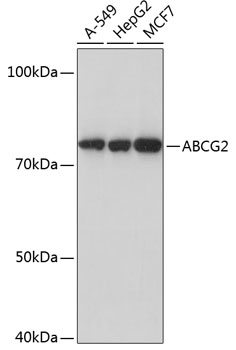Anti-ABCG2 Antibody (CAB17908)
- SKU:
- CAB17908
- Product type:
- Antibody
- Reactivity:
- Human
- Host Species:
- Rabbit
- Isotype:
- IgG
- Research Area:
- Signal Transduction
Description
| 抗体名: | Anti-ABCG2 Rabbit Monoclonal Antibody |
| 抗体コード: | CAB17908 |
| 抗体サイズ: | 20uL, 50uL, 100uL |
| 申し込み: | WB |
| 反応性: | Human |
| 宿主種: | Rabbit |
| 免疫原: | A synthesized peptide derived from human ABCG2 |
| 申し込み: | WB |
| 推奨希釈: | WB 1:500 - 1:2000 |
| 反応性: | Human |
| ポジティブサンプル: | A-549, HepG2, MCF7 |
| 免疫原: | A synthesized peptide derived from human ABCG2 |
| 精製方法: | Affinity purification |
| ストレージバッファ: | Store at -20°C. Avoid freeze / thaw cycles. Buffer: PBS with 0.02% sodium azide, 0.05% BSA, 50% glycerol, pH7.3. |
| アイソタイプ: | IgG |
| 順序: | Email for sequence |
| 遺伝子ID: | 9429 |
| Uniprot: | Q9UNQ0 |
| セルラーロケーション: | |
| 計算された分子量: | 72kDa |
| 観察された分子量: | 72kDa |
| 同義語: | ABC15, ABCP, BCRP, BCRP1, BMDP, CD338, CDw338, EST157481, GOUT1, MRX, MXR, MXR-1, MXR1, UAQTL1, ABCG2 |
| バックグラウンド: | The membrane-associated protein encoded by this gene is included in the superfamily of ATP-binding cassette (ABC) transporters. ABC proteins transport various molecules across extra- and intra-cellular membranes. ABC genes are divided into seven distinct subfamilies (ABC1, MDR/TAP, MRP, ALD, OABP, GCN20, White). This protein is a member of the White subfamily. Alternatively referred to as a breast cancer resistance protein, this protein functions as a xenobiotic transporter which may play a major role in multi-drug resistance. It likely serves as a cellular defense mechanism in response to mitoxantrone and anthracycline exposure. Significant expression of this protein has been observed in the placenta, which may suggest a potential role for this molecule in placenta tissue. Multiple transcript variants encoding different isoforms have been found for this gene. [provided by RefSeq, Apr 2012] |
| UniProt Protein Function: | ABCG2: Xenobiotic transporter that may play an important role in the exclusion of xenobiotics from the brain. May be involved in brain-to-blood efflux. Appears to play a major role in the multidrug resistance phenotype of several cancer cell lines. When overexpressed, the transfected cells become resistant to mitoxantrone, daunorubicin and doxorubicin, display diminished intracellular accumulation of daunorubicin, and manifest an ATP- dependent increase in the efflux of rhodamine 123. Monomer or homodimer; disulfide-linked. Up-regulated in brain tumors. Highly expressed in placenta. Low expression in small intestine, liver and colon. Belongs to the ABC transporter superfamily. ABCG family. Eye pigment precursor importer (TC 3.A.1.204) subfamily. 2 isoforms of the human protein are produced by alternative splicing. |
| UniProt Protein Details: | Protein type:Membrane protein, integral; Transporter; Transporter, ABC family; Membrane protein, multi-pass; Transporter, iron Chromosomal Location of Human Ortholog: 4q22 Cellular Component: nucleoplasm; mitochondrial membrane; plasma membrane; integral to membrane; nucleus Molecular Function:protein binding; protein homodimerization activity; transporter activity; ATPase activity, coupled to transmembrane movement of substances; heme transporter activity; ATP binding; xenobiotic-transporting ATPase activity Biological Process: response to drug; heme transport; urate metabolic process; transport; cellular iron ion homeostasis; xenobiotic transport; multidrug transport; transmembrane transport Disease: Blood Group, Junior System; Uric Acid Concentration, Serum, Quantitative Trait Locus 1 |
| NCBI Summary: | The membrane-associated protein encoded by this gene is included in the superfamily of ATP-binding cassette (ABC) transporters. ABC proteins transport various molecules across extra- and intra-cellular membranes. ABC genes are divided into seven distinct subfamilies (ABC1, MDR/TAP, MRP, ALD, OABP, GCN20, White). This protein is a member of the White subfamily. Alternatively referred to as a breast cancer resistance protein, this protein functions as a xenobiotic transporter which may play a major role in multi-drug resistance. It likely serves as a cellular defense mechanism in response to mitoxantrone and anthracycline exposure. Significant expression of this protein has been observed in the placenta, which may suggest a potential role for this molecule in placenta tissue. Multiple transcript variants encoding different isoforms have been found for this gene. [provided by RefSeq, Apr 2012] |
| UniProt Code: | Q9UNQ0 |
| NCBI GenInfo Identifier: | 67462103 |
| NCBI Gene ID: | 9429 |
| NCBI Accession: | Q9UNQ0.3 |
| UniProt Secondary Accession: | Q9UNQ0,O95374, Q4W5I3, Q53ZQ1, Q569L4, Q5YLG4, Q86V64 Q8IX16, Q96LD6, Q96TA8, A0A1W3, A8K1T5, |
| UniProt Related Accession: | Q9UNQ0 |
| Molecular Weight: | 72,314 Da |
| NCBI Full Name: | ATP-binding cassette sub-family G member 2 |
| NCBI Synonym Full Names: | ATP-binding cassette, sub-family G (WHITE), member 2 |
| NCBI Official Symbol: | ABCG2 |
| NCBI Official Synonym Symbols: | MRX; MXR; ABCP; BCRP; BMDP; MXR1; ABC15; BCRP1; CD338; GOUT1; CDw338; UAQTL1; EST157481 |
| NCBI Protein Information: | ATP-binding cassette sub-family G member 2; urate exporter; ABC transporter; placenta specific MDR protein; breast cancer resistance protein; ATP-binding cassette transporter G2; mitoxantrone resistance-associated protein; placenta-specific ATP-binding cassette transporter; multi drug resistance efflux transport ATP-binding cassette sub-family G (WHITE) member 2 |
| UniProt Protein Name: | ATP-binding cassette sub-family G member 2 |
| UniProt Synonym Protein Names: | Breast cancer resistance protein; CDw338; Mitoxantrone resistance-associated protein; Placenta-specific ATP-binding cassette transporter; Urate exporter |
| UniProt Gene Name: | ABCG2 |
| UniProt Entry Name: | ABCG2_HUMAN |


